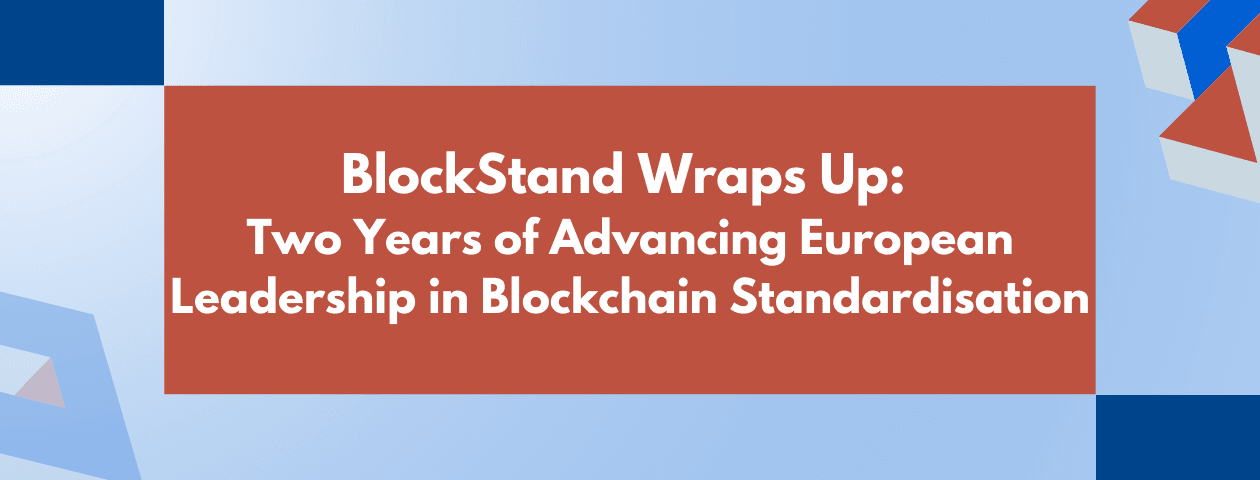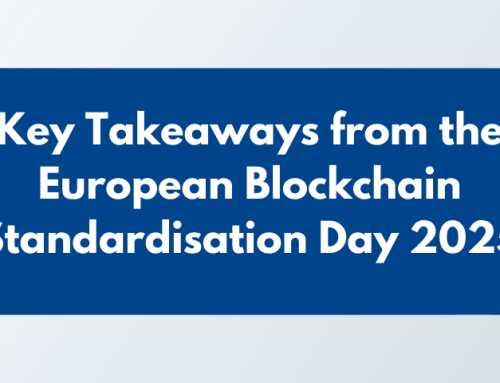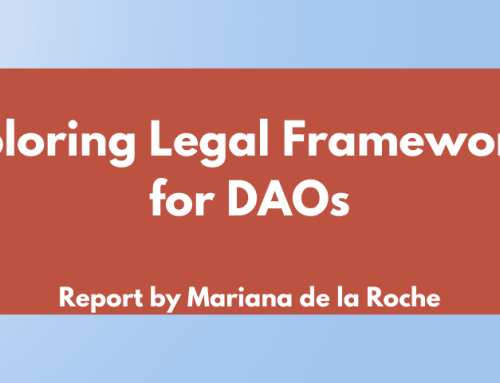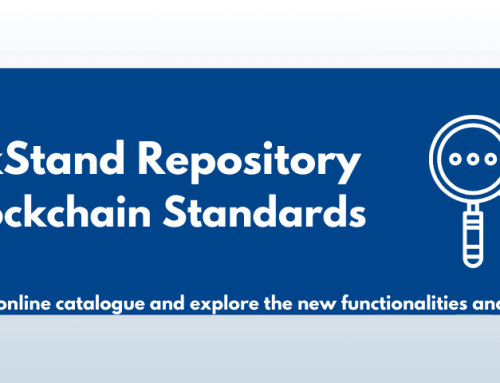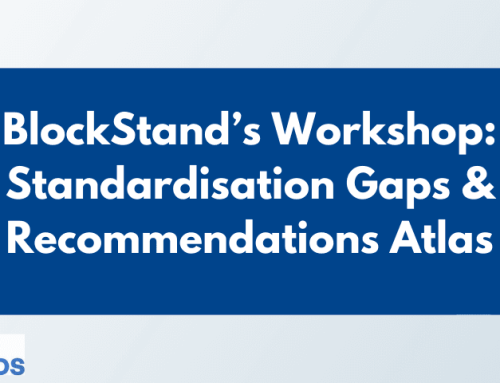-
During its course, BlockStand has worked with 33 European experts working across more than 15 SDOs to deliver a total of 83 contribution aimed at strengthening EU leadership in blockchain standardisation
-
Strategic outputs from the project included its Standardisation Gaps and Recommendation Atlas, the European Blockchain Standardisation Roadmap and the project’s contributions to the ICT Rolling Plan on ICT Standardisation
-
The project’s Blockchain standardisation Facility & Community Tool acted as a central hub on the topic, featuring the Online Repository of Blockchain Standards, the experts’ contributions, the selection process and other relevant resources
-
BlockStand has involved more than 2500+ stakeholders across more than 30 events, culminating with the high-profile European Blockchain Standardisation Day aligned with the ISO/TC 307 Plenary Week in Brussels
During its course, BlockStand has worked with 33 European experts working across more than 15 SDOs to deliver a total of 83 contribution aimed at strengthening EU leadership in blockchain standardisation
Strategic outputs from the project included its Standardisation Gaps and Recommendation Atlas, the European Blockchain Standardisation Roadmap and the project’s contributions to the ICT Rolling Plan on ICT Standardisation
The project’s Blockchain standardisation Facility & Community Tool acted as a central hub on the topic, featuring the Online Repository of Blockchain Standards, the experts’ contributions, the selection process and other relevant resources
BlockStand has involved more than 2500+ stakeholders across more than 30 events, culminating with the high-profile European Blockchain Standardisation Day aligned with the ISO/TC 307 Plenary Week in Brussels
The EU-funded project BlockStand has officially concluded its two-year journey, successfully strengthening Europe’s presence and leadership in global blockchain standardisation. Since its inception in May 2023, BlockStand has delivered on its ambitious goals to position European stakeholders — and values — at the forefront of the global standardisation agenda for blockchain and distributed ledger technologies (DLT).
Over its 24-month course, BlockStand established itself as a cornerstone for European blockchain coordination and outreach and the project has been a recognised bridging point for experts, policymakers, SMEs, and standardisation organisations.
Driving Expert Involvement and Shaping Standards
At the heart of BlockStand’s achievements was its open, inclusive expert selection that supported 33 leading European experts in blockchain and DLT standardisation. A total of 83 expert contributions were successfully delivered, with approximately 200 meetings attended across key standardisation groups globally. In total, €332,000 was allocated to support their standardisation efforts.
The experts came from 14 EU countries, with a group composed of 25 men and 8 women, and represented Europe in 16 different Standards Developing Organisations (SDOs) and National Standards Bodies (NSBs), including ISO/TC 307, CEN-CENELEC JTC 19, ETSI, DIF, ITU-T, W3C, and others.
Experts provided technical deliverables, participated in international meetings, and advanced work on key priorities such as trust frameworks, smart contracts, decentralised identity, and alignment with eIDAS and the European Blockchain Services Infrastructure (EBSI). Their success stories demonstrated both the breadth of their knowledge and the strategic value of EU-supported participation.
Shaping the Future of Blockchain Standardisation
Complementing the coordination of its selected experts, BlockStand produced several landmark outputs, among many others:
- The Standardisation Gaps & Recommendations Atlas, mapping stakeholder needs and existing gaps from SMEs, EBSI actors, and the R&I community;
- The European Blockchain Standardisation Roadmap, setting strategic directions for future work;
- Annual contributions to the EC Rolling Plan on ICT Standardisation, shaped through input from the Technical Coordination Board, the Executive Management Board, and the wider blockchain community.
These deliverables serve not only as direct inputs into policy processes but also as strategic reference points for Europe’s ongoing positioning in blockchain standardisation.
A Lasting Resource: BlockStand’s Tools for the Community
A central innovation of the project was the creation of the BlockStand Standardisation Facility & Community Tool, the project’s main digital hub. This platform provides:
- A Repository of Blockchain Standards, an interactive database cataloguing blockchain/DLT standards across international SDOs;
- A Resources & Publications section, featuring deliverables and expert reports;
- Access to the Stakeholder Forum, hosted by the DIGITAL SME Focus Group Blockchain & DLT;
- Public profiles and technical contributions from selected experts.
These tools remain available post-project and are key to ensuring long-term sustainability and utility of BlockStand’s achievements.
Strengthening Dialogue and Innovation in the Blockchain Standardisation Ecosystem
BlockStand engaged its community through over 34 events, including stakeholder workshops, thematic webinars, and policy roundtables. All events attracted significant interest, with some reaching audiences of over 100 participants. Altogether, more than 2,500 participants were engaged across the project’s public outreach, highlighting its strong relevance in both the blockchain and standardisation landscapes.
A flagship moment was the European Blockchain Standardisation Day, co-organised with SEEBLOCKS.eu and aligned with the ISO/TC 307 Plenary Week. The event brought together over 190 stakeholders, including European Commission officials, global standardisation leaders, and blockchain industry and research representatives.
Through events, complemented by communication and community engagement activities, BlockStand fostered cross-sector dialogue and made the case for strong EU leadership in international blockchain standardisation—connecting standardisation experts, academia, policymakers, and industry, with a particular focus on empowering European SMEs.
Leaving a Lasting Legacy
BlockStand has demonstrated that with the right support mechanisms, European experts can significantly influence international blockchain standards while upholding EU values. It successfully bridged the gap between policy and technical implementation, industry and research, and European and international arenas.
Its legacy is not only in the deliverables and expert contributions but also in the network it has cultivated and the structures it leaves behind. The Standardisation Facility and its embedded community are set to continue serving Europe’s blockchain stakeholders—ensuring that the EU remains at the forefront of blockchain innovation and standardisation.

